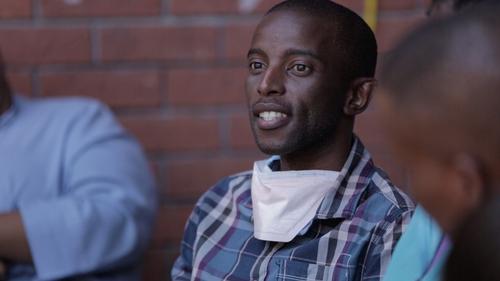Siyabulela Qwaka is the latest patient cured of drug resistant TB in MSF’s project in Khayelitsha, South Africa. His story is an inspiration for the others currently fighting the new form of tuberculosis against which existing drugs are of limited effectiveness.
The two dozen patients he addresses in the Town II clinic in Khayelitsha, a sprawling township in the outskirts of Cape Town, punctuate his speech with nods. Siyabulela is their beacon of hope: last February, he was cured of extensively-drug resistant tuberculosis (XDR-TB) in MSF’s Khayelitsha project near Cape Town. They all suffer from the same disease, and they all know that the journey to a cure is paved with slippery stones.As his journey is over, Siyabulela has abandoned the weapon he had been using for the past two years to fight his illness: humour. “We used to pretend the treatments were a joke. Even though I knew I wasn't strong, I pretended to be. I joked along with my friends about my death, but deep down, I didn't want to die,” he says.
Siyabulela was part of a group of four patients who all started the same treatment for the same disease at the same time, two years ago. But he is the only one who beat it. The others are long gone, a fading memory that the support group would prefer not to think about. In South Africa, only 13% of patients diagnosed with XDR-TB get cured.
In its Khayelitsha project MSF is thriving to address this issue, notably by introducing new drugs like Linezolid, a drug initially developed to beat other bacteria but that has shown promising results against DR-TB like in Siyabulela’s case. But because it is protected by a patent in South Africa, it is so expensive that it cannot be offered to all who need it. Some other specific TB drugs are in the pipeline of pharmaceutical companies but are not yet available to the public. They represent a great hope, but their commercial release is still years ahead.
“It was a long journey,” Siyabulela remembers. “When you come to the clinic, they call you to a secluded room and the doctor tells you that you are not only positive, you are ‘positive plus plus’. Then you realize there's really no hope.”
This was in March 2012. Three months earlier, an X-ray had revealed a hole in his lung. Tuberculosis. The DR-TB epidemic used to be blamed on patients who did not take their TB treatment correctly and therefore built up resistance to the drugs. However, a recent University of Cape Town study found that 80% of the DR-TB patients in South Africa caught the resistant strain of the bacteria by simply breathing it. Like Siyabulela, many have never had TB before catching the drug-resistant variety.
It was the beginning of what Siyabulela, quoting Nelson Mandela’s words, calls his long walk to freedom. Since none of the brand new TB drugs are yet commercially available, the only drugs doctors can prescribe today against the resistant form of the bacteria are extremely toxic and come with potentially horrendous side effects. Phumeza, the first XDR-TB patient to be cured in Khayelitsha, is now permanently deaf because of some of the old TB drugs she was prescribed.
When you come to the clinic, they call you to a secluded room and the doctor tells you that you are not only positive, you are ‘positive plus plus’. Then you realize there's really no hope.
Siyabulela Qwaka
Even though Siyabulela was lucky not to experience the most extreme side effects that can be triggered by the treatment, it was harrowing. The most difficult were the nine months during which he had to go to the clinic every day to receive very painful injections as part of his treatment course – so painful it was hard to sit down. He also found it hard to take a dozen pills every day, knowing that they can often make him so nauseous that it’s impossible to keep them down.
Siyabulela decided that he would fight the disease with all he had. For two years, he focused all his energy on winning his health back; he had to quit his job as a software developer and focus on the harrowing treatment, making ends meet thanks to social grants. That was a difficult decision, knowing that in Khayelitsha jobs are scarce: only 40 per cent of adults of working age have full time employment.
At age 28, Siyabulela’s life was put on hold, but with the cure came a surge of hope and energy. He registered for refresher courses at college to make up for two years out of the job market and, after six months of searching high and low, he finally found a new job in an IT company.
Siyabulela has won the fight for his life. He concludes his speech to the other patients by reminding them that the heroes of South Africa, Nelson Mandela and Desmond Tutu, also had TB at some stage. “That’s an encouragement,” he says. “This disease, it's for heroes. If you can fight this that means you can stand anything in this world.”
He sits down to clapping from the other patients. One voice – clear, strong, hopeful – raises in a song. The rest of the group follows in a polyphonic, a capella chant of the style that has been the pulse of the South African society for centuries. They sing in a unified chorus: “Even when it rains/ You’ve got to get out. Doctor Jenny, please give us Linezolid”.



